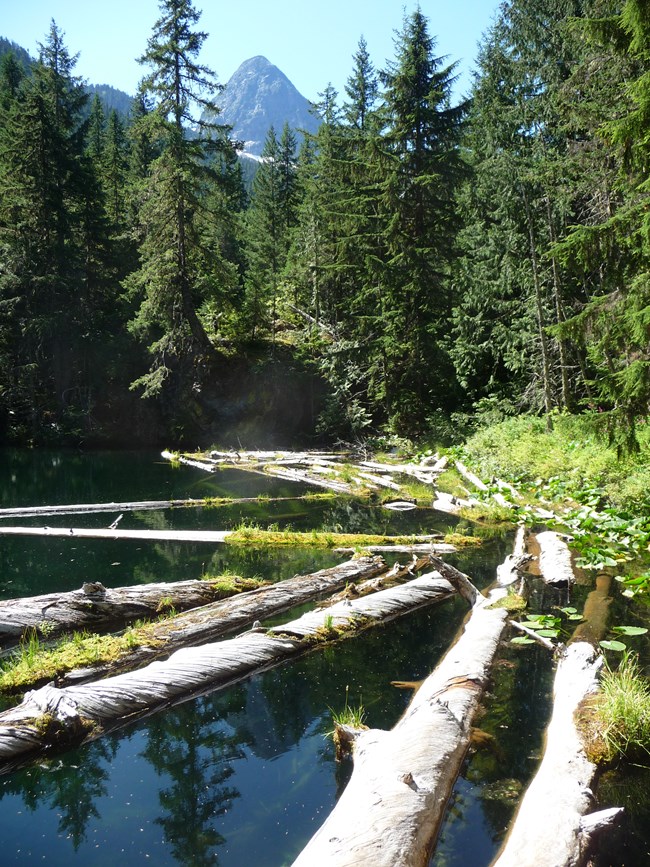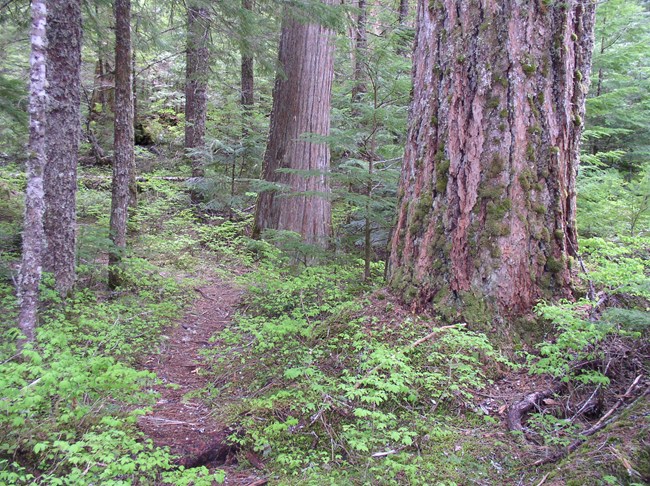|
Here are your waters and your watering place. Drink and be whole again beyond confusion.

NPS / Rosemary Seifried Pyramid Lake is a short day hike with moderate elevation gain. There is a broad diversity of plant and animal habitat along the way. The trail ends at a pretty little mountain lake, with floating log "gardens" and a tranquil atmosphere. Climbers use this trail to gain access to the grand peaks above—Colonial, Pyramid, and Snowfield. See the detailed trail description for more information on this area. Special Concerns:
Backcountry Camping: A backcountry permit is required for all overnight stays. Permits are limited. There is no camping allowed at Pyramid Lake or along the trail corridor. Climbers using this trail to access points above must be at least one-half mile past the lake before camping. Access: Drive State Route 20 to just east of Gorge Lake (mile post 126.8). Park on the north side of the road, and then find the signed trailhead across the highway by the cascading waters of Pyramid Creek. 
NPS Detailed Trail Description Along the lower trail, notice the evidence of fire: blackened trunks of large Douglas-fir trees and thickets of young fir and lodgepole pine. Both of these trees are fire adapted. Lodgepole pine requires intense heat for its seeds to be released from their seed cones. Douglas-fir have very thick bark, allowing a few to survive fires and reseed burn areas. Both species require exposed soil and open sunlight to germinate and grow. This slope, with varying amounts of light exposure and wetness, provides many niches for wildlife. Watch and listen for bird life. Snags and partially dead trees host woodpeckers, squirrels and many other cavity-dwellers. The upturned trill of the Swainson's thrush rises from forest tops, while the chattery song of the winter wren permeates the shadowy forest depths. A highlight of the trail is the stream crossing at .9 miles (1.4 km). Here, especially on a hot day, is a place to rest and enjoy the coolness and beauty of the stream and forest glade. Some of the large cedars are over 500 years old. The main attraction is this small, deep mountain lake. Created by an ancient landslide, it is now a place of diverse life. Many insects skim the surface, their larvae feeding in the rich ooze on the bottom. The aquatic rough-skinned newt is a top order consumer. Sundew is another fascinating life form. It is the insect eating plant found growing on decaying floating logs. At Pyramid Lake there has been little human influence on natural cycles. Fish were never planted here. Pyramid Lake and surrounding lands are protected as a "Research Natural Area." Such areas are set aside for the scientific study of natural processes and life systems. Pyramid Lake is a place to visit, study, and enjoy. Camping is not allowed in order to maintain the pristine quality of this special place. 
|
Last updated: August 30, 2021
